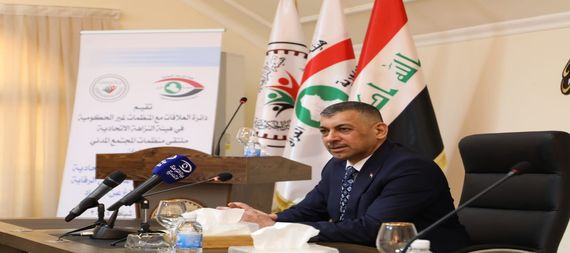Baghdad/Nina/ The head of the Federal Integrity Commission, Judge Haider Hanoun, stressed the importance of the Commission’s role in preparing the draft law on the right to obtain information and insisting on its approval, noting its importance in establishing the rules of transparency and making information available to citizens and the media regarding the work of the executive authority, its projects, and the percentage of completion therein, as well as its tenders and contracts. Its cost is speculative.
Judge Haider Hanoun, during his speech at the dialogue forum held by the Department of Relations with Non-Governmental Organizations in the Commission and entitled (Cooperation between the Federal Integrity Commission and civil society organizations in oversight, monitoring and reporting of corruption), in which a number of representatives of civil society organizations participated, noted the importance of establishing partnerships and strengthening The bonds between the Authority and community organizations, indicating that these organizations have a major role in enhancing transparency and justice in the policy-making and decision-making processes in a way that guarantees the interests of all segments of society on the one hand, and on the other hand, obtaining the support of those segments, in addition to striving to preserve the dignity and interests of citizens and individuals. Threatening those responsible, and combating individual human rights violations through legal means.
Hanoun pointed to the role of civil society organizations and the media in supporting the anti-corruption legislation launched by the Commission, the most important of which is the law on the right to access information, stressing the Commission’s need for pressure groups to work with it to complete the legal system that combats corruption on the one hand, and to work to establish a culture of the rule of law. And creating a fair environment in society on the other hand, by developing long-term programs that establish a society free of corruption, noting that while the Commission is working to strengthen the relationship and communication with civil society organizations, it is at the same time inviting some of those organizations whose reports the international organizations receive information from. Including adopting objectivity and balance in diagnosing negatives, consolidating successes, and motivating those with achievements and initiatives.
The forum, whose sessions were moderated by the Assistant Director General of the Department of Relations with Organizations at the Commission (Dr. Hussein Maan), discussed two topics. The first dealt with the mechanisms of work of civil society organizations in oversight, monitoring and writing reports, while the second was devoted to enhancing legal and societal awareness, as the two researchers reviewed the role of the organizations. In monitoring the performance of state institutions, diagnosing defects and delays, and monitoring suspicions of administrative and financial corruption, cases of inflation in officials’ funds, and conflicts of interest, alerting to the importance of involving all sectors, segments, and groups in confronting the scourge of corruption and eradicating its effects from state institutions, pointing to the texts contained in the applicable local laws and in International and Arab instruments and agreements, including the United Nations and Arab Anti-Corruption Conventions, which identified the necessity of establishing strong partnerships with these organizations and supporting them extensively to combat corruption, as well as facilitating the work of strong civil society at the national, regional and international levels, including groups working in the fields of human rights and human rights. Workers, governance, economic development, environment and private sector accountability.
The participants in the forum called for working to create an environment that repels corruption, amending financial disclosure forms to suit the nature of the organizations’ work and tasks, striving to pass laws that support transparency and enabling the media and community activities to access information about the executive authority, its contracts and its estimated costs, and involving representatives of those organizations Intensive courses to familiarize themselves with the applicable laws, especially the laws for the institutions that they monitor, in order to carry out their supervisory role in accordance with the legal contexts, and to invest in the religious platform and educational and pedagogical institutions in disseminating and disseminating values, virtuous morals, and good behavior, most importantly honesty, chastity of the hand, and the sanctity of public money./End 7
To receive more news, subscribe to our channel on Telegram


